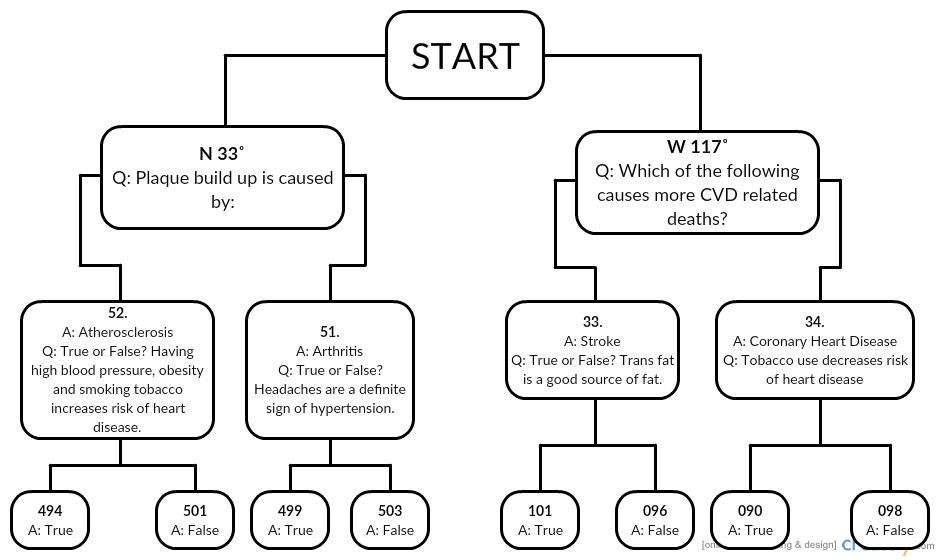Information
Cardiovascular diseases, also known as CVDs, cause the most death globally, with 17.5 million people passing in 2012 due to complications with the disease. CVD deaths are caused mostly by stroke and coronary heart disease, with the latter causing more CVD related deaths.
Some cardiovascular diseases are caused by the building up of plaque in major arteries in the heart. The plaque can later narrow and eventually block the artery, stopping blood flow to and from the heart. This buildup is also known as atherosclerosis.
The stopping of blood flow most commonly causes heart attacks and strokes. Heart attacks occur when the blood clot stops blood flow within the heart. Symptoms caused by a heart attack include
- Chest discomfort or pain - which occurs in the center of the chest and lasts for a few minutes or goes away and comes back; which can feel like uncomfortable squeezing, fullness, pain, or pressure.
- Upper pain and discomfort in one or both arms, jaw, back, and stomach
- Shortness of breath - which can occur with or without chest discomfort
- Cold sweats
- Nausea
- Light dizziness
If a blood clot occurs in the brain, a stroke may occur. Signs of a stroke include slurred speech, sudden numbness or weakness in the face or limbs on one side of the body, sudden difficulty in understanding speech, sudden difficulty in vision in one or both eyes, sudden difficulty in walking, severe headaches, and fainting spells. According to Mayo Clinic, if not treated properly, strokes can cause permanent damage to parts of the brain, which leads to paralysis and difficulty talking or swallowing due to less control over muscles, memory loss or loss of emotional control, pain, and inability to take care of self. Stroke may also lead to death.
Another cause of cardiovascular disease is high blood pressure, or hypertension. High blood pressure occurs when the force of blood pumping through blood vessels is too high. If blood pressure reaches higher than 180/110 mm Hg, the person is in an emergency situation. Also known as the "silent killer", there are no general symptoms for hypertension. However, there are indirect signs of hypertension, such as dizziness, blood spots in the eyes, and extreme redness in the face. If left untreated, hypertension can lead to heart attacks, strokes, or other CVDs.
Most heart diseases are caused by an unhealthy diet with high saturated fat, such as trans fat or hydrogenated oils, high sodium, and high sugar; physical inactivity due to lack of exercise; obesity; and use of alcohol and tobacco use.
Stage 1: Coordinates

Once you arrive, look for the multiple identical red signs, and follow the 90 degree ones. Pass through West and East Avenue.
Stage 2: Questions to Code
Format: X 000 XXX
X = Letter, 0 = Number
1. What is the maximum systolic (first number) blood pressure before a person is in an emergency situation? Divide this number by 10.
2. Slurred speech is a sign of a heart attack. True = 618; False = 616
3. What is another name for a cardiovascular disease?
To locate your goal, seek where can information can be found.
Stage 3: Combination to Lock
1. Heart disease is known as the silent filler. True = 5; False = 9
2. What is the highest blood pressure before a person is in an emergency situation? If this answer is more than one digit, add all of the individual digits of your answer together until you reduce the number to a single digit.
3. How many symptoms of heart disease are listed on the cache description?
You can check your answers for this puzzle on GeoChecker.com.